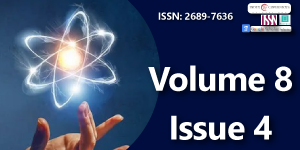Ion Transport, Current–noise in Nanopores and Conical Nanopores
Main Article Content
Abstract
Abstract
In this paper, we build an ion transport model that requires less computational cost. We study the ion transport firstly in conical nanopores. We study the current-time in conical nanopores. The noise is modelled in our study. The noise in conical nanopores is due to the pore diameter and salt concentration. We consider 1 M KCl. We extend our study to understand the current time in nanopores. We consider the graphene nanopores. The noise in our nanopores model is due to the pore diameter only. We consider 1 M KCl. We study the influence of ion transport from the conductance relation to concentration for the solid-state nanopores. The concentrations studied are 0.003 M, 0.01 M, 0.03 M, 0.05 M, 0.15 M, 0.3 M, 0.4 M, 0.5 M, and 1 M KCl. We study the linear current-voltage characteristics for solid-state nanopores. We consider 1 M KCl. The study of nanofluidics can find applications in energy, water desalination, and neuromorphic computing devices.
Downloads
Article Details
Copyright (c) 2025 Vishal NVR.

This work is licensed under a Creative Commons Attribution 4.0 International License.
Siria A, Poncharal P, Biance AL, Fulcrand R, Blase X, Purcell ST, et al. Giant osmotic energy conversion measured in a single transmembrane boron nitride nanotube. Nature. 2013 Feb 21;494(7438):455–8. Available from: https://doi.org/10.1038/nature11876
Lee C, Joly L, Siria A, Biance AL, Fulcrand R, Bocquet L. Large apparent electric size of solid-state nanopores due to spatially extended surface conduction. Nano Lett. 2012 Aug 8;12(8):4037–44. Available from: https://doi.org/10.1021/nl301412b
Feng J, Graf M, Liu K, Ovchinnikov D, Dumcenco D, Heiranian M, et al. Single-layer MoS2 nanopores as nanopower generators. Nature. 2016 Aug 11;536(7615):197–200. Available from: https://doi.org/10.1038/nature18593
Emmerich T, Vasu KS, Niguès A, Keerthi A, Radha B, Siria A, et al. Enhanced nanofluidic transport in activated carbon nanoconduits. Nat Mater. 2022 Jun;21(6):696–702. Available from: https://doi.org/10.1038/s41563-022-01229-x
Rankin DJ, Bocquet L, Huang DM. Entrance effects in concentration-gradient-driven flow through an ultrathin porous membrane. J Chem Phys. 2019 Jul 29;151(4):044705. Available from: https://doi.org/10.1063/1.5108700
Balme S, Picaud F, Manghi M, Palmeri J, Bechelany M, Cabello-Aguilar S, et al. Ionic transport through sub-10 nm diameter hydrophobic high-aspect ratio nanopores: experiment, theory and simulation. Sci Rep. 2015 Jun 3;5:10135. Available from: https://doi.org/10.1038/srep10135
Jain T, Rasera BC, Guerrero RJ, Boutilier MS, O'Hern SC, Idrobo JC, et al. Heterogeneous sub-continuum ionic transport in statistically isolated graphene nanopores. Nat Nanotechnol. 2015 Dec;10(12):1053–7. Available from: https://doi.org/10.1038/nnano.2015.222
Wang H, Nandigana VVR, Jo KD, Aluru NR, Timperman AT. Controlling the ionic current rectification factor of a nanofluidic/microfluidic interface with symmetric nanocapillary interconnects. Anal Chem. 2015 Mar 17;87(6):3598–605. Available from: https://doi.org/10.1021/ac5019638
Nandigana VVR, Jo K, Timperman A, Aluru NR. Asymmetric-fluidic-reservoirs induced high rectification nanofluidic diode. Sci Rep. 2018 Sep 17;8:13941. Available from: https://doi.org/10.1038/s41598-018-32284-7
Ragulranjith SK, Nandigana VVR. Membrane measurement, device simulations of nanochannel, nanopore and nanofluidics electronics calculator. Trans Eng Comput Sci. 2025;13:1–61. Available from: https://doi.org/10.14738/tmlai.1304.19127
Forni T, Baldoni M, Piane FL, Mercuri F. GrapheNet: a deep learning framework for predicting the physical and electronic properties of nanographenes using images. Sci Rep. 2024;14:24576. Available from: https://doi.org/10.1038/s41598-024-75841-z
Smeets RMM, Keyser UF, Dekker NH, Dekker C. Noise in solid-state nanopores. Proc Natl Acad Sci U S A. 2008 Jan 15;105(2):417–21. Available from: https://doi.org/10.1073/pnas.0705349105
Heerema SJ, Schneider GF, Rozemuller M, Vicarelli L, Zandbergen HW, Dekker C. 1/f noise in graphene nanopores. Nanotechnology. 2015 Feb 20;26(7):074001. Available from: https://doi.org/10.1088/0957-4484/26/7/074001
Feng J, Liu K, Graf M, Dumcenco D, Kis A, Di Ventra M, et al. Observation of ionic Coulomb blockade in nanopores. Nat Mater. 2016 Aug;15(8):850–5. Available from: https://doi.org/10.1038/nmat4607
Powell MR, Martens C, Siwy ZS. Asymmetric properties of ion current 1/f noise in conically shaped nanopores. Chem Phys. 2010 Aug 7;375(2–3):529–35. Available from: https://doi.org/10.1016/j.chemphys.2010.06.008
Portillo S, Ramirez P, Mafe S, Cervera J. Neuromorphic reservoir computing with memristive nanofluidic diodes. Nano Lett. 2025;25(11):9928–34. Available from: https://doi.org/10.1021/acs.nanolett.5c00853
Keithley Digital Multimeter, Bench, 6.5 Digit, DMM6500. Industry Buying, India. Available from: https://www.industrybuying.com/digital-multimeters-keithley-TES.DIG.932431721
Welch D. The use of fast Fourier transform for the estimation of power spectra: a method based on time averaging over short, modified periodograms. IEEE Trans Audio Electroacoust. 1967;15(2):70–3. Available from: https://barnes.atmos.colostate.edu/COURSES/AT655_S15/references/Welch_1967_IEETransAudioElect.pdf
Patil O, Manikandan D, Nandigana VVR. A molecular dynamics simulation framework for predicting noise in solid-state nanopores. Mol Simul. 2020;46(12):1011–6. Available from: http://dx.doi.org/10.1080/08927022.2020.1798004
Merck. Available from: https://www.sigmaaldrich.com/
Schoch RB, Han J, Renaud P. Transport phenomena in nanofluidics. Rev Mod Phys. 2008 Jul 16;80(3):839–83. Available from: https://doi.org/10.1103/RevModPhys.80.839
Pennathur S, Santiago JG. Electrokinetic transport in nanochannels. 1. Theory. Anal Chem. 2005 Oct 1;77(21):6772–81. Available from: https://doi.org/10.1021/ac050835y
Pennathur S, Santiago JG. Electrokinetic transport in nanochannels. 2. Experiments. Anal Chem. 2005 Oct 1;77(21):6782–9. Available from: https://doi.org/10.1021/ac0508346
Ho C, Qiao R, Heng JB, Chatterjee A, Timp RJ, Aluru NR, et al. Electrolytic transport through a synthetic nanometer–diameter pore. Proc Natl Acad Sci U S A. 2005 Jul 26;102(30):10445–50. Available from: https://doi.org/10.1073/pnas.0500796102

